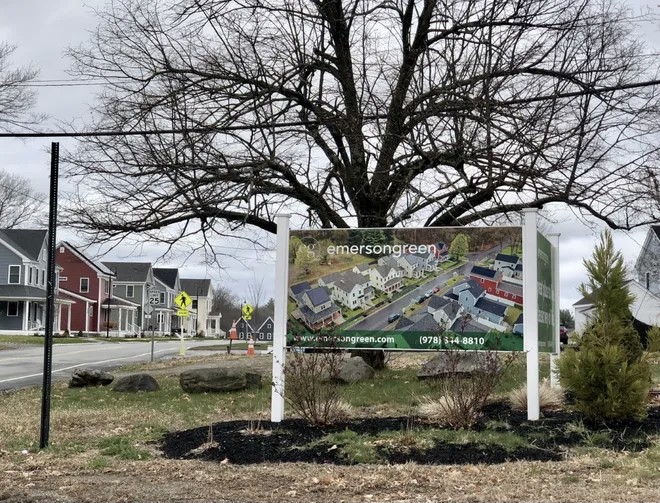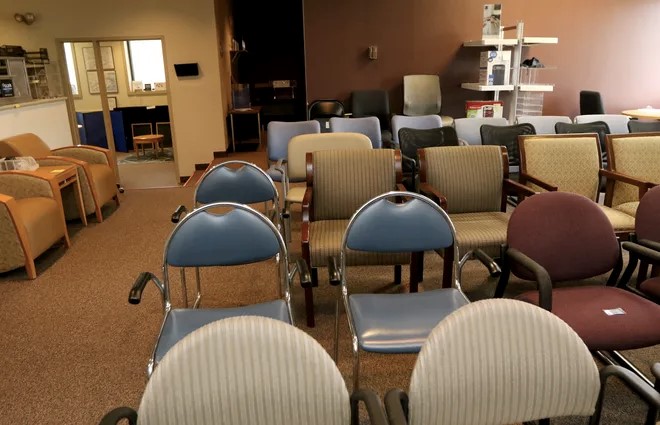How four Massachusetts communities are thinking outside of the box to save the environment
USA Today, by Hadley Barndollar
When corporate offices opt for new furniture, or close up shop entirely as remote work culture persists, where do the discarded chairs and desks go? The filing cabinets, manila folders and cubicle panels?
Think about what happens when a manufacturer of medical supplies tosses all of its plastic waste. Or when a department store shutters — leaving display cases and racks across thousands of square feet.
If not for The Great Exchange program in Devens, Massachusetts, "it would be in the landfill," said Dona Neely, the program's founder.
At the former U.S. Army base, now a burgeoning commercial hub guided by aggressive sustainability goals, unwanted materials are repurposed via a large-scale operation that sends them back out into the community for use.
With Earth Day approaching on April 22, the USA TODAY Network is highlighting four Massachusetts communities implementing unique solutions to remedy the climate crisis.
Last year, the Bay State enacted first-in-the-nation climate legislation, establishing emissions goals that it's now obligated to reach by law. Many cities and towns have stepped up to supplement state-level action, taking local responsibility for the grim climate reality: New England is warming faster than the rest of the country with sea levels rising more quickly than the global rate.
A recent report from the United Nations reiterated a frightening timeline. Global greenhouse gas emissions must be reduced by 43% by 2030 to limit global warming to around 1.5C, or 2.7°F.
Just 7 square miles, Devens has around 500 residents, and yet, it boasts more than 6,000 jobs across 120-plus businesses. That could mean a major environmental footprint for the employment nucleus that occupies pieces of Ayer, Harvard and Shirley.
But at this "premier eco-industrial park," said Peter Lowitt, director of the Devens Enterprise Commission, "one firm's waste stream is another firm's source of raw materials."
On site at The Great Exchange, bins are overflowing with unused translucent orange prescription pill bottles. There are outdated interior design tile and fabric samples, rows of three-ring binders, and packaging supplies such as foam and bubble wrap. One shelf is lined with stacks of ring slot trays and jewelry boxes, recovered from counters at closed Macy's and Sears stores.
"Eco-industrial means that you're looking at businesses as a symbiotic relationship," said Lowitt. "Instead of the traditional linear model of 'take raw materials, make a product, throw stuff away,' we’re introducing the concept of return. The circular economy."
Consulting with Boston-based climate action firm Kim Lundgren Associates and advocacy group Environment Massachusetts, the USA TODAY Network identified municipalities, like Devens that offer inventive green ideas.
Concord's heat pump coaches help homes switch to electric
The term "coach" typically yields images of sports – a fevered individual yelling from the sidelines, or someone delivering a pep talk to an anxious huddle.
But in the town of Concord, a group of coaches is educating fellow residents on electric heat pumps, which take the place of fossil fuels that currently heat the majority of Massachusetts' buildings.
The building sector's transition to electric heat is critical for the state to stamp out its greenhouse gas emissions – as required by law in two phases, first by 2030 and then 2050.
It's also a tremendous, gargantuan task – one that involves converting 100,000 homes per year from natural gas or oil to electric heat, according to the state's own climate plan, for the next 25-30 years. Meanwhile, a survey done by the Massachusetts Clean Energy Center found that half of state residents don't know what heat pumps are.
Communicating the "what" and "why" of electric heat to consumers can be a challenge, especially when the current dollar signs attached don't necessarily reflect the anticipated future savings – when more renewable energy sources such as wind and solar come online.
"We realize that a lot of people just don't have a lot of information about the technology," said Concord heat coach Kim Slack. "And it's disruptive, because for the first time in human history, we don't have to burn things to stay warm. It's hard for people to get their heads around."
Piloting the grant-funded heat pump coaching program is the Concord Municipal Light Plant – a public power utility – in partnership with Abode Energy Management.
Coaches like Slack are trained and paid through the grant, and have already gone through their own electric transitions. They help educate residents – for free – on the benefits and logistics of switching to electric heat, and the available financial incentive programs – like MassSave's rebate program and Concord Municipal Light Plant's commitment to match MassSave.
"It reduces some of the friction along the way," he said. "There are many choices and you're going to get lots of different sales pitches. Particularly with new technology, you need help."
Slack said Concord's heat coaching effort came about after the town's climate action plan identified 65% of emissions were coming from its buildings.
"I don't know of many programs like this around," he said. "There are communities that do volunteer coaching, but this has been formalized to a high degree."
Slack said the program has received more than 300 inquiries since its start last year. Forty percent of those coached say they are pursuing heat pumps for heating and cooling, according to Kim Lundgren Associates, the town's climate consultant, and the program reports a three-month average time from initial client meeting to heat pump installation.
A 'circular economy' in Devens: Repurposing furniture, supplies and more
Fort Devens U.S. Army Base officially closed in 1996 and came under the ownership of MassDevelopment. Devens today is not a town or city, explained Lowitt, but rather "a quasi-municipal state agency that acts as a municipality."
Dominated by businesses and light on residents, Devens is home to an array of industries – biopharmaceutical company Bristol Myers Squibb, the Northeast's largest lettuce producer, a sustainable-certified golf course, and robotics and plastics manufacturers. There's a veterans services agency, and a 47-acre commercial fusion energy campus is in the works. Dunkin' Donuts has a central bakery on site, and many movies and streaming shows are filmed locally at New England Studios.
"In a traditional industrial park, you have businesses doing their own thing," said Neil Angus, Devens Enterprise Commission's environmental planner. "The concept here is working to bring those businesses together. The glue that connects the businesses and helps them work together to maximize efficiencies, share resources, collaborate and exchange information."
 |
| Program Administrator Amanda Lansing put items on the shelves at The Great Exchange in Devens, April 19, 2022. Wicked Local Staff Photo/Ann Ringwood
|
Devens has been recognized nationally for its sustainability and environmental efforts, which include the work done by the Devens Eco-Efficiency Center through The Great Exchange program. By collecting unwanted, usable materials and distributing them back into the community, the program diverts thousands of pounds from landfills each year and creates a self-sustaining system within the old Army base.
Landfills are collectively one of the nation's largest sources of methane, a greenhouse gas more than 25 times as potent as carbon dioxide at trapping heat in the atmosphere, according to the Environmental Protection Agency.
In 2021, staff and volunteers recovered nearly 19,000 pounds of unneeded resources, which later went to businesses, municipal departments, nonprofits, schools and libraries in more than 50 towns for 50% of retail price.
"We've been able to facilitate a lot of really creative partnerships," said Neely, executive director at the Devens Eco-Efficiency Center.
Neely and her small team are working with a realty company that is repurposing all of Becker College's buildings in Worcester after the school's closure last year. So far, they've recovered 4,000 pounds of materials that, as a result, won't be thrown away.
When Learning Express Toys closed its Devens location, the Great Exchange was able to recover nearly 10 carloads of brand new toy samples. Health care provider Reliant Medical closed 18 of its offices in a consolidation move a few years ago, yielding more than 20,000 pounds of items to be repurposed, one of the largest hauls to date, said Neely.
"More businesses are becoming aware of operating in a more sustainable manner and minimizing their footprint," she said. "And our motivation is how grateful our target audience is to get access to these resources."
The program has a significant social impact, too. Trays from a food manufacturer went to an initiative supporting immigrant farmers, and teachers struggling to afford supplies for their students can mine the vast collection of supplies.
The Great Exchange is among a multitude of climate-oriented efforts occurring in Devens. Included in its climate resiliency plan are more than 70 "ambitious and achievable actions" to reduce environmental impact and improve community resilience in the face of climate change.
 |
| Emerson Green, an energy-efficient housing development in Devens, is currently in its second phase of construction. Hadley Barndollar/USA TODAY Network
|
Among those is the objective to increase the number of net zero energy and energy-plus homes, said Angus, as Devens works to attract more residents and create "fully, truly sustainable neighborhoods," featuring single-family homes, multi-unit condos and apartments.
New Bedford's green infrastructure focuses on environmental justice populations
Once a leader in the whaling industry and today the country's No. 1 fishing port based on dollars coming across the docks, the city of New Bedford is also making a name in green infrastructure.
In the coastal working-class city, 78.3% of residents are categorized by the state as environmental justice populations, based on the number of minority, low-income, and/or language isolated residents. These communities are often disproportionately impacted by climate hazards, and in New Bedford, most live in densely developed areas with the oldest city infrastructure, and are hardest hit by flooding and urban heat.
After securing grant funding to create a green infrastructure master plan, New Bedford is pursuing natural solutions that will reduce flooding and pollution to supplement its human-engineered water management infrastructure.
NB Resilient, the city's climate action plan, describes green infrastructure as "a range of methods that use nature-based solutions to store or absorb storm water to reduce flows to sewer systems or surface waters." Those include natural drainage systems, rain gardens, permeable pavement, green roofs and tree planting.
The city's environmental justice communities are getting a particular focus in the process, with several community-based organizations representing their diverse interests in the planning, which began in 2021.
“These practices make us better prepared for extreme weather, lessen damage from storm water, and improve the quality of the water running off our buildings and streets," said New Bedford Mayor Jon Mitchell.
Meanwhile, New Bedford is on track to become a national hub for the evolving wind power industry when Vineyard Wind – the nation's first utility-scale wind farm currently under construction – begins operations.
Worcester lets residents, businesses chose more renewable energy
In the state's second largest city, residents and business owners have the choice to see a larger percentage of their electricity – either 40% or 100% – come from renewable energy sources.
Through its Community Choice Aggregation program, Worcester is using its bulk purchasing power to reduce its carbon footprint. The program was recognized last year by advocacy nonprofit Environment Massachusetts in its annual "Renewable Communities" report.
"We wanted to offer to residents and businesses an option that has been vetted, provides stable prices for three years, and purchases more green electricity than is mandated by the state," said Luba Zhaurova, director of projects for Worcester's Department of Sustainability and Resilience.
The purchasing program, launched in February 2020, provides Worcester electricity customers with double the amount of renewable energy included in National Grid's basic service, the state-required renewable energy minimum. The program offers two clean electricity choices: its Standard Green "default," currently 40% of electricity from renewable energy sources, or a "100% Green" option.
"I feel that when we talk about the program, it's a 'feel good' piece of information for folks," said Zhaurova.
Zhaurova said about 100 customers have elected for 100% renewable energy through the program – a small number in a city of more than 185,000. But city officials are hoping to increase participation at the 100% level, which costs more, a challenging task amid the energy price surge related to the war in Ukraine, Zhaurova noted.
According to the city, the amount of renewable electricity added to Worcester’s electricity supply for each year of its 34-month electricity contract with Direct Energy Services LLC will be about equal to taking more than 6,000 passenger vehicles off the road, or eliminating energy use of more than 3,500 homes
All new electricity accounts in Worcester are automatically enrolled in the Community Choice Aggregation program, unless the resident or business elects to opt out, allowing for higher participation, said Zhaurova.
While the program ensures electricity supply costs remain stable for the life of the three-year contract, which expires this coming December, savings aren't guaranteed because of National Grid’s price changes.



